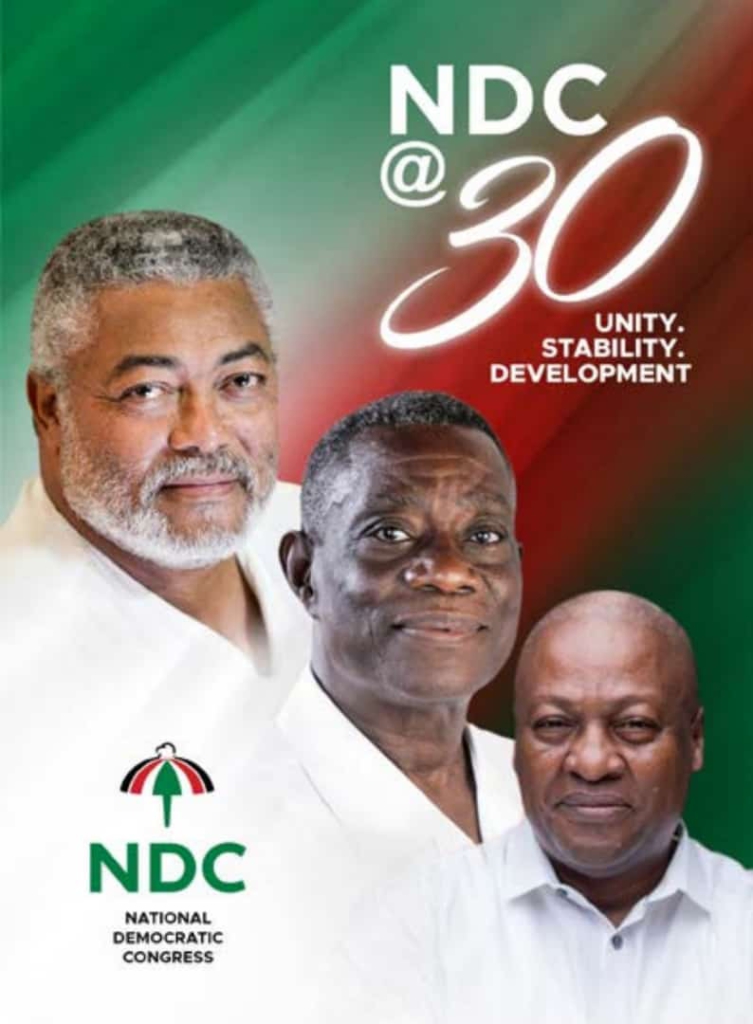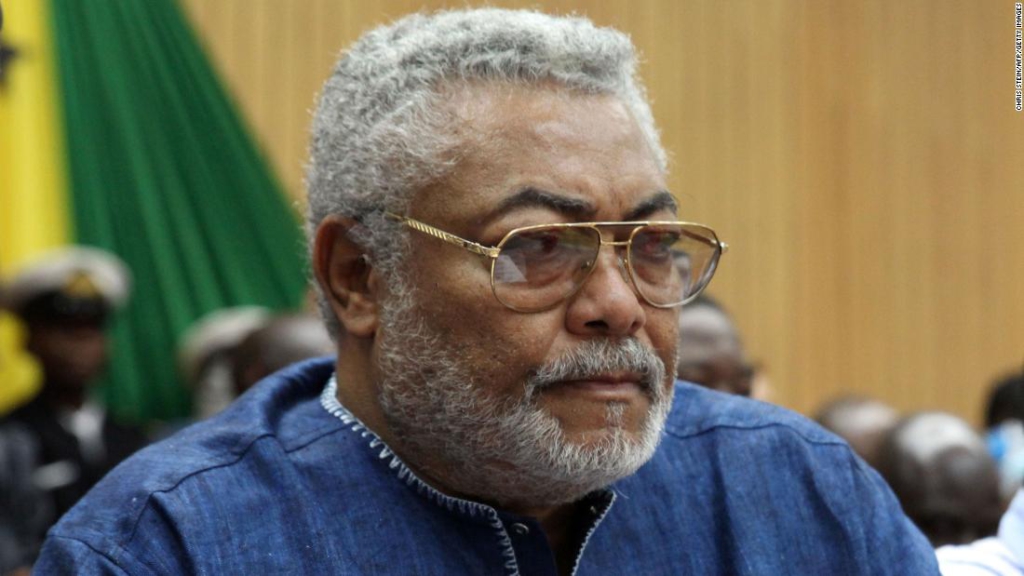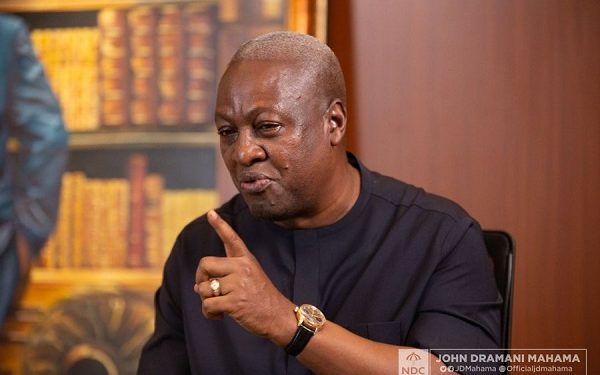Ghana's former President, John Dramani Mahama has called on government to welcome criticisms, while protecting journalists across the country.
According to him, the safety of journalists and the guarantee of free speech are essential in deepening Ghana's democracy.
In a Facebook post to mark the 30th Anniversary Celebration of the opposition National Democracy Congress (NDC), the NDC's 2020 flagbearer underscored the relevance of democracy and charged the governing New Patriotic Party (NPP) to work hard to safeguard it.
"The NDC genuinely believes that the essence of democracy is to make life better for all citizens. This is why every time it has had the privilege of leading this country, the NDC strives to create opportunities for all Ghanaians, irrespective of ethnic, religious or political affiliation.
The NDC also believes democracy goes beyond enriching family and friends, because it involves using the nation's resources responsibly to address the felt needs of all Ghanaians. Democracy, transparency and accountability are bed fellows, and therefore, while creating opportunities for all, leaders are also required to wage a strong battle against corruption", he noted.
The former head of state also added that: "The NDC knows that a media cowed into silence and an intimidated citizenry do not constitute the appropriate resource for sustainable progress and national development. We believe, therefore, that the ability of citizens to express themselves freely is a right and not a privilege."
"This administration must learn to tolerate criticisms and enhance free speech while protecting journalists from harm", he admonished.

Having reiterated the need for government to shield Ghana's democracy from destruction, he also used the opportunity to assure Ghanaians of the NDC's resolve to transform the country and better the lives of citizens should it win the 2024 general election.
On that score, he stated that, "The NDC assures every Ghanaian of better years ahead. We have done it before; bringing tangible socio-economic infrastructure to your communities and ensuring the economy works for all of us and not just a privileged few".
Mr. Mahama also used the medium to charge members of the NDC and the youth to contribute their lot to make Ghana better.
While commending the sacrifices of the party's founder, the late Flt. Lt. Jerry John Rawlings, and other founding stalwarts of the 'umbrella family', Mr. Mahama wrote:
"On this solemn day, I commend our forebears who have sacrificed their all to get us here. On this auspicious 30th anniversary day, June 10, 2022, I ask all NDC members and sympathizers including the youth of Ghana; and all Ghanaians to "Arise, Arise for Ghana" wherever we find ourselves".

"Ghana needs our collective and patriotic energies to rescue her from the decay we see today. Arise, Arise for Ghana!", the statement ended.
A brief history of the NDC as compiled by the NDC's National Communication Bureau
The National Democratic Congress (NDC) is a social democratic political party in Ghana, founded by Jerry John Rawlings. He was the Head of State of Ghana from 1981 to 1993 and the President of Ghana from 1993 to 2001.
The NDC has its roots from two major events, the June 4 1979 uprising and the 31St December Revolution, which set the tone for transparency, accountability, probity and social justice in governance.
Such critical values had eluded several administrations since the 1957 declaration of independence; thus leading to military interventions.
The rules of engagement set by the June 4 uprising that led to the hand-over of power to Dr. Hilla Limann's civilian administration were abused; thus, ushering in the 31St December Revolution.
Following the formation of the Provisional National Defence Council (PNDC), which prosecuted a "Holy War" on corruption and other social injustices, the country was ruled from 1982 to 1992 under the banner, "The decade that stopped the decay".
Socio-economic and political factors underpinned the demand to return the country to civil rule. That called for the re-awakening of old political forces, principally, the Nkrumahists and Danquah-Busia-Dombo traditions.
It is of interest to know that, the operatives of the June 4 uprising (a mostly military venture which called itself the Armed Forces Revolutionary Council - AFRC), and the 31St December Revolution (a mix of military and civilians, which constituted the Provisional National Defence Council - PNDC) were all people who had their heritage from either of the two political traditions.
It became a matter of debate between two major schools of thought. One school believed that a solid foundation had been laid for a tranquil civilian political climate and therefore operatives of the two processes could retire and join their original camps.
It was however the opinion of another school that, there was the necessity to form a political party for good reasons: to protect the gains of the two processes, and to simmer down the excesses born out of the pains some families accused the operatives of the processes.
Another salient factor was the need to form the foundations of a third force to break the existing duopoly that had been antagonistic and acrimonious to each other rather than being alternative agents for development.
Looking back, especially, on the political history of vilification, hatred and extreme polarization during the pre- and post-independence periods, it was a wiser choice that the school of thought to form a political party, mostly for the three reasons stated, won the hearts of the majority of adherents.
As a new block in the political scheme of affairs, with several shades of personalities from the military, Nkrumahist, Danquah-Busia- Dombo traditions, old and young revolutionaries who emerged from June 4 and 31st, and non-conformist admirers of Jerry John Rawlings - the leading architect of the
new order, it became obvious that a party-out-of-many was the right way to go.
So the adherents of JJ, the Jerryists, joined the old political players who were now seriously operating under several banners.
For example, the Danquah-Busia-Dombo tradition mostly operated under the banner of "The Patriots". The Nkrumahist groups were championed by "The New Nation". For the Jerryist camp, Eagle 1, Eagle 2, Rawlings Fun Club and others were very visible.
To determine a name for the party was also a task. Some were of the opinion that, in order not to deviate and therefore forget our roots, it was expedient to choose People's National Democratic Congress (to retain the abbreviation "PNDC" of old).
Others were rather magnanimous to drop the "P" so as to churn a new path; thus, the National Democratic Congress - NDC.
It was "National" because it cut across the whole nation with its patrons. It was "Democratic" because it believed in the tenets of social democracy which proffered the gradual development of society based on freedom, equality, and solidarity of practitioners in achieving the common good.
It was a "Congress" because it was built on the concept, "out of many, one group".
The colours of the party were chosen to be Green (the resources of our land), White (the perpetual flame of victory), Red (remembering the struggles through the blood and toil of our forebear), and Black (our roots as Africans).
The colours were designed in the form of an umbrella (Akatamanso), with the head of a bird perching at the top to signify the need for perpetual vigilance.
A slogan to direct the cause and course of the essence of forming the party was developed to stress the unity (needed for building consensus and expression of the commonality of purpose), stability (needed for continuity of policies and programmes) and development (needed to scale citizens from poverty and want to prosperity).
Towards its formation, the National Democratic Congress was given its provisional certificate by the Electoral Commission on June 10th 1992, which granted the NDC the right to operate as a legally registered political party.
The joy attracted thousands of party faithfuls to the Centre for National Culture (Arts Centre), where a colourful ceremony was organized to outdoor the certificate.
That is why that day is regarded as the Founding Day of the party. It is also instructive to mention that the final certificate of the registration of the party was issued by the Electoral Commission on 27th July, 1992.
Since its inception, the party has so far won four out of the eight general elections since 1992.
The governments of 1993-1996, and 1997-2000 (under Jerry John Rawlings), 2009-2012 (under Atta-Mills) and 2012-2016 under John Dramani Mahama were formed.
Latest Stories
-
Chiefs and MMDCEs to lead the charge against galamsey – Lands Minister
7 minutes -
EC rules out immediate re-run of Ablekuma North parliamentary polls, says only 3 polling stations in dispute
24 minutes -
Justice Ackaah-Boafo set to face scrutiny in high-stakes vetting tomorrow
29 minutes -
KNUST’s Prof. Hadrat Yusif calls for central bank independence, cites monetary policy failures
50 minutes -
Armed soldiers allegedly guarding illegal mining site in Anwiaso East Forest Reserve
58 minutes -
The hard work to help the NPP begins now – Bawumia to NPP MPs after shown of support
1 hour -
This is a strong show of support – Bawumia grateful to NPP MPs for endorsing him for flagbearer
2 hours -
Zebilla MP calls for urgent action to tackle climate threats and avert food crisis in Northern Ghana
2 hours -
UniMAC is committed to practical teaching and learning – Prof Yaw Gyau
2 hours -
Photos from the 2025 Ghana Academy of Arts and Sciences occasional lecture
2 hours -
Over 500 wooden structures destroyed by fire at Tema
2 hours -
JoyNews uncovers galamsey enclave in Anwiaso East forest reserve with over 30 excavators
2 hours -
There is a lot of work to do – Bawumia to NPP MP loyalists as 2028 support swells
2 hours -
Choose words that heal and uplift – Asunafo North MP marks International Day for Countering Hate Speech
2 hours -
Joynews Impact Makers Awards 2025 set for June 28
2 hours

